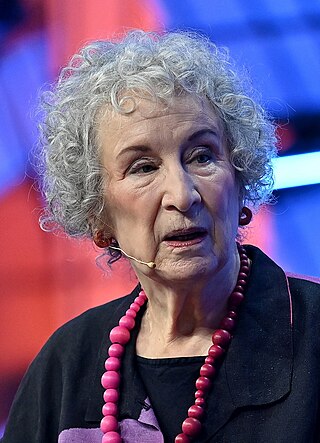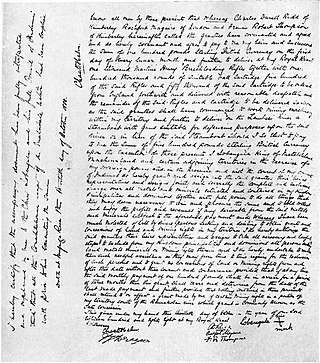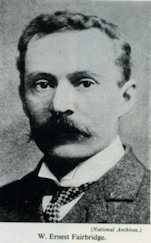Related Research Articles
Benjamin William Bova was an American writer and editor. During a writing career of 60 years, he was the author of more than 120 works of science fact and fiction, an editor of Analog Science Fiction and Fact, for which he won a Hugo Award six times, and an editorial director of Omni; he was also president of both the National Space Society and the Science Fiction Writers of America.

Margaret Eleanor Atwood is a Canadian poet, novelist, literary critic, essayist, teacher, environmental activist, and inventor. Since 1961, she has published eighteen books of poetry, eighteen novels, eleven books of non-fiction, nine collections of short fiction, eight children's books, two graphic novels, and a number of small press editions of both poetry and fiction. Atwood has won numerous awards and honors for her writing, including two Booker Prizes, the Arthur C. Clarke Award, the Governor General's Award, the Franz Kafka Prize, Princess of Asturias Awards, and the National Book Critics and PEN Center USA Lifetime Achievement Awards. A number of her works have been adapted for film and television.
Edward Paul Jones is an American novelist and short story writer. He received the Pulitzer Prize for Fiction and the International Dublin Literary Award for his 2003 novel The Known World.

Lieutenant-Colonel William Coutts Keppel, 7th Earl of Albemarle,, MP, ADC, styled Viscount Bury between 1851 and 1891, was a British soldier and politician. He served in the British Army before entering Parliament in 1857. Initially a Liberal, he served as Treasurer of the Household between 1859 and 1866 in the Liberal administrations headed by Lord Palmerston and Lord Russell. He later switched to the Conservatives and held office as Under-Secretary of State for War under Lord Beaconsfield between 1878 and 1880 and under Lord Salisbury between 1885 and 1886.

The Carnegie Corporation of New York is a philanthropic fund established by Andrew Carnegie in 1911 to support education programs across the United States, and later the world.

The Rudd Concession, a written concession for exclusive mining rights in Matabeleland, Mashonaland and other adjoining territories in what is today Zimbabwe, was granted by King Lobengula of Matabeleland to Charles Rudd, James Rochfort Maguire and Francis Thompson, three agents acting on behalf of the South African-based politician and businessman Cecil Rhodes, on 30 October 1888. Despite Lobengula's retrospective attempts to disavow it, it proved the foundation for the royal charter granted by the United Kingdom to Rhodes's British South Africa Company in October 1889, and thereafter for the Pioneer Column's occupation of Mashonaland in 1890, which marked the beginning of white settlement, administration and development in the country that eventually became Rhodesia, named after Rhodes, in 1895.

When Smuts Goes is a dystopian novel by Dr. Arthur Keppel-Jones. The novel is set during a future history of South Africa, following the ascension of Afrikaner nationalists and their increasingly destructive quest for total apartheid. It foreshadowed the fall of Jan Christiaan Smuts and his United Party administration, a rupture in ties with the British Commonwealth, and the declaration of a Second South African Republic. Presiding over the regime which follows is Obadja Bult, a dominion theologian influenced by the ideals of the former Ossewabrandwag. His blunt authoritarian streak gives spark to racial conflict—culminating in foreign intervention and troubled majority rule.

Jacqueline Jones is an American social historian. She held the Walter Prescott Webb Chair in History and Ideas from 2008 to 2017 and is Mastin Gentry White Professor of Southern History at the University of Texas at Austin. Her expertise is in American social history in addition to writing on economics, race, slavery, and class. She is a Macarthur Fellow, Bancroft Prize Winner, and has been a finalist for the Pulitzer Prize twice.

Black science fiction or black speculative fiction is an umbrella term that covers a variety of activities within the science fiction, fantasy, and horror genres where people of the African diaspora take part or are depicted. Some of its defining characteristics include a critique of the social structures leading to black oppression paired with an investment in social change. Black science fiction is "fed by technology but not led by it." This means that black science fiction often explores with human engagement with technology instead of technology as an innate good.

Arthur Leo Zagat (1896–1949) was an American lawyer and writer of pulp fiction and science fiction. Trained in the law, he gave it up to write professionally. Zagat is noted for his collaborations with fellow lawyer Nat Schachner. During the last two decades of his life, Zagat wrote short stories prolifically. About 500 pieces appeared in a variety of pulp magazines, including Thrilling Wonder Stories, Argosy, Dime Mystery Magazine, Horror Stories, Operator No. 5 and Astounding. Zagat also wrote the "Doc Turner" stories that regularly appeared in The Spider pulp magazine throughout the 1930s and the "Red Finger" series that ran in Operator #5, and wrote for Spicy Mystery Stories as "Morgan LaFay". A novel, Seven Out of Time, was published by Fantasy Press in 1949, the year he died. His more well known series is probably the Tomorrow series of 6 novelettes from Argosy collecting into 2 volumes by Altus Press in 2014.
Michael Manga is a Canadian-American geoscientist who is currently a professor at the University of California, Berkeley.

This is a survey of the postage stamps and postal history of Zimbabwe.

Keppel Harcourt Barnard was a South African zoologist and museum director. He was the only son of Harcourt George Barnard M.A. (Cantab.), a solicitor from Lambeth, and Anne Elizabeth Porter of Royston.

Zoo City is a 2010 science fiction novel by South African author Lauren Beukes. It won the 2011 Arthur C. Clarke Award and the 2010 Kitschies Red Tentacle for best novel. The cover of the British edition of the book was awarded the 2010 BSFA Award for best artwork, and the book itself was shortlisted in the best novel category of the award.
Graeme Charles Arthur Wood is an American staff writer for The Atlantic and a lecturer in political science at Yale University since 2014. Prior to his staff writer position he was a contributing editor to The Atlantic, and he has also written for The Cambodia Daily,The New Yorker, The American Scholar, The New Republic, Bloomberg Businessweek, Culture+Travel, The Wall Street Journal and the International Herald Tribune. He served as books editor of Pacific Standard. He was awarded the 2015-2016 Edward R. Murrow Press Fellowship of the Council on Foreign Relations and a 2009 Reporting Fellowship Grant from the South Asian Journalists Association.
Lieutenant-Colonel Sir Marshal James Clarke was a British colonial administrator and an officer of the Royal Artillery. He was the first Resident Commissioner in Basutoland from 1884 to 1893; Resident Commissioner in Zululand from 1893 to 1898; and, following the botched Jameson Raid, the first Resident Commissioner in Southern Rhodesia from 1898 to 1905.
In 1949 the historian Arthur Keppel-Jones wrote Friends or Foes? A point of view and a programme for racial harmony in South Africa, which claimed that devolution into federalist states would promote harmonious relations between the different population groups of South Africa. Several decades later, in 1974, the Mahlabatini Declaration of Faith, which stressed the federal concept, was signed. In 1977 the Progressive Federal Party was started, which advocated power-sharing through a federal constitution. Today, the political parties which advocate a federal system for South Africa, are the Democratic Alliance and the Inkatha Freedom Party.

William Ernest Fairbridge JP was a newspaper publisher and municipal official during the early British occupation of Southern Rhodesia. A man, "whose indomitable pluck in the face of endless discouragements deserves an honourable place in the history of journalistic enterprise," he published Rhodesia's first newspaper, the Mashonaland Herald and Zambesian Times in 1891. He also served as the first Mayor of Salisbury in 1897. He subsequently became a leading publishing executive with the Argus group of Newspapers in South Africa.

The Riverman is a 2004 American biographical crime drama television film directed by Bill Eagles and written by Tom Towler, based on the 2004 non-fiction book The Riverman: Ted Bundy and I Hunt for the Green River Killer by Robert D. Keppel and William J. Birnes. Shot in Halifax, Canada, the film stars Bruce Greenwood, Sam Jaeger, Kathleen Quinlan, and Cary Elwes. It premiered on A&E on September 6, 2004. The film follows real life incidents around how convicted infamous serial killer Ted Bundy helps detectives Robert D. Keppel and Dave Reichert by providing insights into the mind of a psychopath killer to catch then active murderer Green River Killer aka Gary Ridgway.
References
- ↑ Jeeves, Alan H. (May 1995). "Arthur Keppel-Jones: Scholar, Teacher, and Liberal Intellectual". South African Historical Journal. 32: 24–33. doi:10.1080/02582479508671823.
- ↑ "Keppel-Jones, Arthur". The Encyclopedia of Science Fiction . 30 April 2017. Retrieved 15 February 2018.
- ↑ Visser, Nicholas (1993). "The Politics of Future Projection in South African Fiction". In Fletcher, Pauline (ed.). Black/White Writing: Essays on South African Literature. Lewisburg, Pennsylvania: Bucknell University Press. pp. 63–64. ISBN 9780838752623. OCLC 26502102.